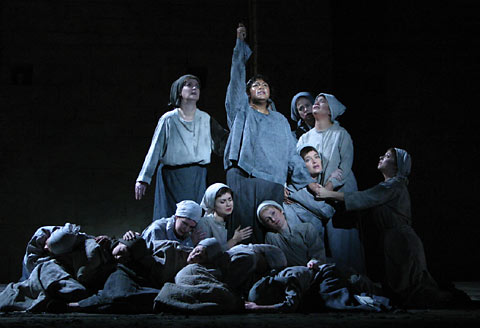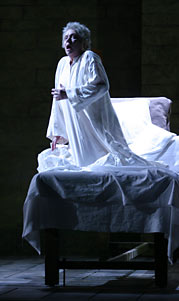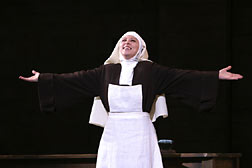|
|
|
| La Scena Musicale Online Reviews and News / Critiques et Nouvelles |

Visit La Scena Musicale Online Reviews. [Index] Critiques de La Scena Musicale Online
Vancouver Opera's Dialogues of the Carmelites a moving spiritual journey
By Joseph So January 3, 2006 |  |

Francis Poulenc's Dialogues of the Carmelites has the rare distinction of a 'contemporary' opera that has managed to establish itself in the standard repertoire. I put 'contemporary' in quotation marks because 2007 will mark its 50th anniversary. In terms of musical style, it bears a strong affinity with the past – to Monteverdi, Verdi, Debussy and Mussorgsky, and represents a departure from Poulenc's mid-20th century contemporaries. It is likely that its adherence to tradition accounted for its success – I can't think of any opera by the serialist camp that has achieved the same level of acceptance in the opera houses of the world. Given the secular nature of Poulenc's personal life, it always seems a little odd that he would have penned such a deeply spiritual work. True to his reputation as a man of the theatre, Poulenc injects a strong dose of melodrama to the piece, in a denouement of such galvanizing emotional and musical intensity that even people who are not Catholic cannot fail to be moved.
 In Canada alone, opera companies in Toronto, Vancouver, Calgary and Montreal have mounted productions of the opera on more than one occasion. The current Vancouver Opera revival ranks high in musical and dramatic values. Interestingly, it is in three acts while productions these days are often done in two. The sets and costumes from Glimmerglass Opera are simple and austere, which serves to highlight the spiritual quality of the work. Such simplicity does have its drawbacks – some of the details are minimized as a result. For example, the unit set offers little suggestion of the interior of the Carmelite chapel, and as a result the visual impact of the final mass, the 'infant Jesus' scene and the 'martyrdom vote' scene are considerably lessened. Perhaps the most serious blemish is the diminution of the role of the hysterical crowd of peasants in setting the tone in crucial moments – even in the final scene, they are relatively inert. Under the direction of Tazewell Thompson, who also directed the original production, the focus is very much on the inner spiritual journey of Blanche de la Force. Her transformation from a troubled and fearful – one might say neurotic – young woman to the courageous martyr who willingly joins her fellow nuns to their death by guillotine is deeply moving. In Canada alone, opera companies in Toronto, Vancouver, Calgary and Montreal have mounted productions of the opera on more than one occasion. The current Vancouver Opera revival ranks high in musical and dramatic values. Interestingly, it is in three acts while productions these days are often done in two. The sets and costumes from Glimmerglass Opera are simple and austere, which serves to highlight the spiritual quality of the work. Such simplicity does have its drawbacks – some of the details are minimized as a result. For example, the unit set offers little suggestion of the interior of the Carmelite chapel, and as a result the visual impact of the final mass, the 'infant Jesus' scene and the 'martyrdom vote' scene are considerably lessened. Perhaps the most serious blemish is the diminution of the role of the hysterical crowd of peasants in setting the tone in crucial moments – even in the final scene, they are relatively inert. Under the direction of Tazewell Thompson, who also directed the original production, the focus is very much on the inner spiritual journey of Blanche de la Force. Her transformation from a troubled and fearful – one might say neurotic – young woman to the courageous martyr who willingly joins her fellow nuns to their death by guillotine is deeply moving.
 For this revival, Vancouver Opera assembled an exceptionally strong cast, headed by BC native Kathleen Brett. Seen on opening night, her Blanche was an intriguing mix of vulnerability and inner strength, which served her character well in her final hours of need. Her superb vocalism with its blazing high register was a pleasure. Kudos to the searing Madame de Croissy of Judith Forst, who brought to the character the full force of her years of experience and artistry, her harrowing death scene a stunning theatrical moment. As Sœur Constance, Nathalie Paulin may not possess the crystalline high notes one has come to expect in this role, but her lovely soft-grained sound and personal warmth gave life to the character. The staging unfortunately minimized the dramatic impact of Madame Lidoine, but Measha Brueggergosman offered her unique brand of powerful vocalism. Australian Claire Primose ran into heavy weather with the high tessitura of Mother Marie – her top seriously strained, which ironically served to advantage the repressed aggression of the character. The men folk in this opera are relegated to almost comprimario status, but John Tessier brought Mozartean eloquence to his Chevalier de la Force; and John Fanning brought gravity to the brief role of the Marquis. For this revival, Vancouver Opera assembled an exceptionally strong cast, headed by BC native Kathleen Brett. Seen on opening night, her Blanche was an intriguing mix of vulnerability and inner strength, which served her character well in her final hours of need. Her superb vocalism with its blazing high register was a pleasure. Kudos to the searing Madame de Croissy of Judith Forst, who brought to the character the full force of her years of experience and artistry, her harrowing death scene a stunning theatrical moment. As Sœur Constance, Nathalie Paulin may not possess the crystalline high notes one has come to expect in this role, but her lovely soft-grained sound and personal warmth gave life to the character. The staging unfortunately minimized the dramatic impact of Madame Lidoine, but Measha Brueggergosman offered her unique brand of powerful vocalism. Australian Claire Primose ran into heavy weather with the high tessitura of Mother Marie – her top seriously strained, which ironically served to advantage the repressed aggression of the character. The men folk in this opera are relegated to almost comprimario status, but John Tessier brought Mozartean eloquence to his Chevalier de la Force; and John Fanning brought gravity to the brief role of the Marquis.
In this seriously pared down production, the dining table at the home of the Marquis doubled as Croissy's deathbed, which must have been extremely uncomfortable for the poor Old Prioress! In the Act-3 Blanche-Mother Marie confrontation scene, there was not a stew pot in sight, despite the dialogue. The spoken interlude between the peasant women and a disguised Blanche in Act 3 was also cut. Conductor Jonathan Darlington led a creditable, if somewhat slow-paced performance by the Vancouver Opera Orchestra. For those who missed the show, it was taped for future broadcast on Saturday Afternoon at the Opera. Stay tuned.
Visit La Scena Musicale Online Reviews. [Index] Critiques de La Scena Musicale Online
|
|
|


